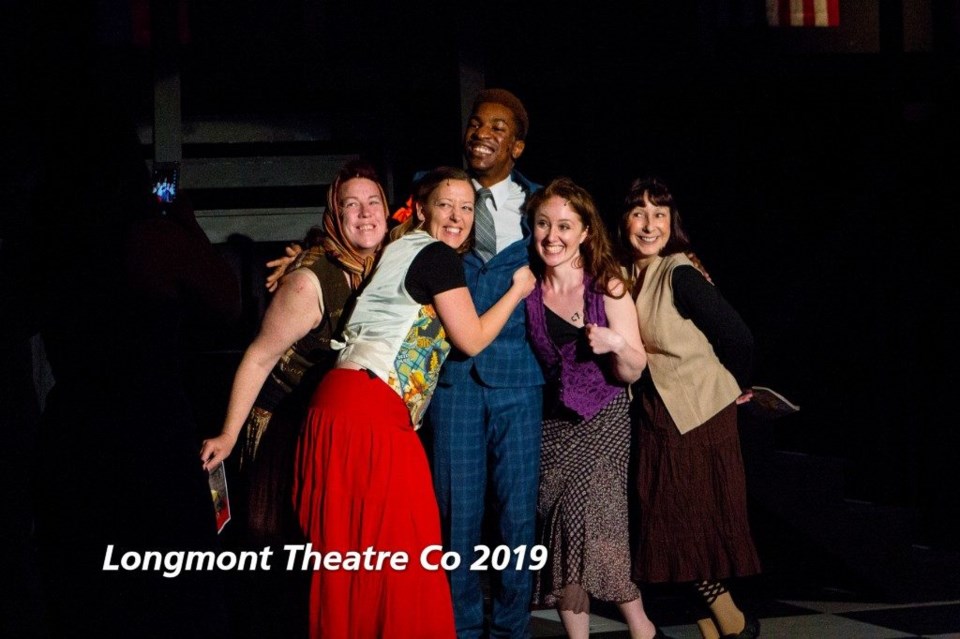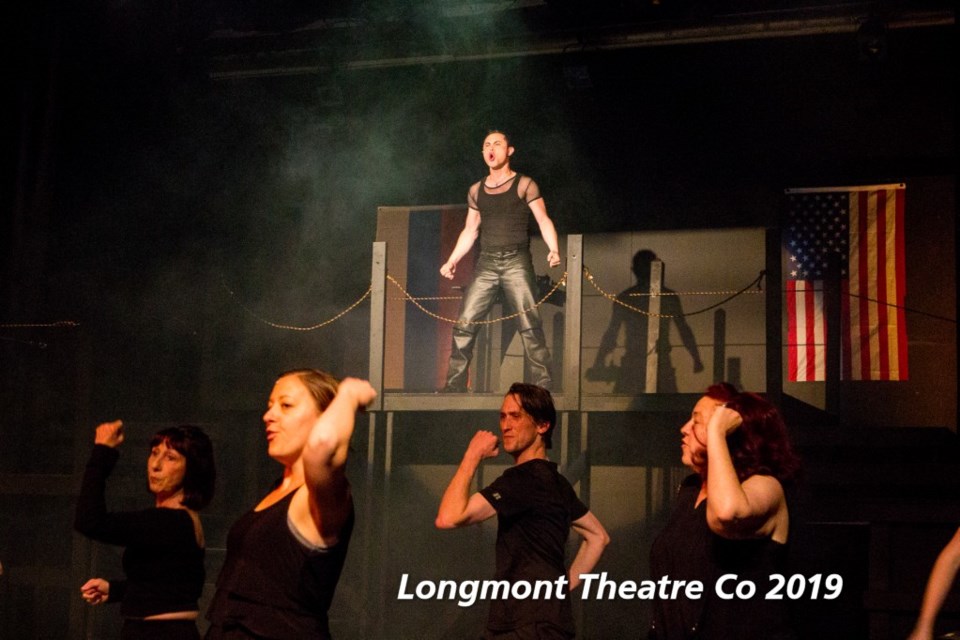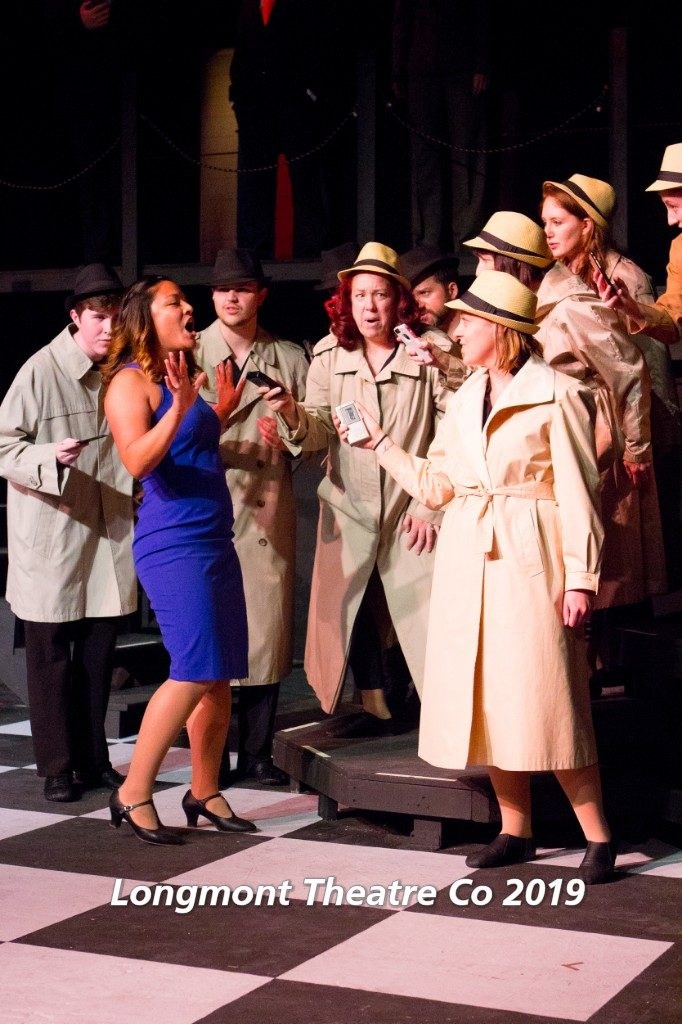This content was originally published by the Longmont Observer and is licensed under a Creative Commons license.
As usual, Faye Lamb, President of the Longmont Theater Company, took to the stage before the curtain went up to introduce the production, remind the audience about turning off cell phones and let everyone know that the next theater season (the 63rd) starts on 13th September, 2019. She also had a surprise this time, though, as she gave the audience some unexpected advice. She told us that Chess is considered one of the most difficult scores in the world of musicals and that the story is complicated and involved. Forewarned is forearmed.
The LTC continues to be adventurous with its musical productions, this time presenting a show that not only contains some blockbuster music from ABBA and lyrics by the inimitable Tim Rice, but also a chess allegory for the Cold War of the 1980s, and a love triangle involving a Russian, an American and a Hungarian. And you can probably add a fourth to the plot – another Russian. The idea came from Rice, who was inspired by the 1972 World Chess Championship between Bobby Fischer and Boris Spassky and was turned into a book by Richard Nelson.
This production is the “UK version” of the musical, which was first performed in London’s West End in 1986, where it ran for three years. The “US version” opened on Broadway in 1988, having been changed from the original London production, but only lasted for three months. Since then, there have been many other productions throughout the world – Australia, Sweden, Hungary, New Zealand – mostly based on the UK version, but usually with changes to the roles of the cast members and even the denouement of the story.
The prologue introduces the complete ensemble and describes the long and complex history of the game of chess. Despite the rather cramped surroundings on stage, the cast performs with brio and enthusiasm. This carries on to the somewhat corny song extolling the virtues of Merano, where the long-anticipated world chess championship will take place.
Here we are introduced to “The American”, Freddie Trumper, and his long-suffering wife (maybe?) and manager, Florence. It is obvious from the start that Freddie is a difficult character, and Preston Adams does an excellent job of conveying his narcissism and bad manners, as well as showing a fine, strong tenor voice.

Freddie and Florence (Tiffany Sieu Gruman) despair of the negative press they are getting from the “Commie Newspapers” and Freddie lashes out at the ever-present reporters.
Now we also find out that all is not well in “The Russian’s” camp. Baritone Steven Hartman plays Anatoly Sergievsky with strength and pathos – he is frustrated by the “third rate propaganda” surrounding him and tells his second, Molokov that “I take the rap if I lose”.
So starts the machinations and convolutions initiated by Molokov, well played by bass Erik Josh, complete with a red tie so that we can tell who the Russians are.
And now it is time for the main event to begin and we are introduced to The Arbiter, who is the referee and somewhat sinister overseer of the proceedings. Marcus Neppi gives his all in the "Opening Ceremony" production, well supported by the dance ensemble, and The Arbiter makes it clear that “there's no gambit I don't see through”.

The actual chess matches take place on the balcony at the rear of the stage. The lighting makes it a little difficult to see exactly what is happening when the two Grand Masters sit down opposite each other, but perhaps that is just as well. The ensemble dances to represent the action above on a large chess board at stage front. Their headdresses portraying various chess pieces didn’t quite work and tended to be a distraction from the intricate choreography.
Now the plot thickens, with Freddie taunting Florence after she admonishes him yet again for his boorish behavior. He reminds her that her family was displaced and maybe imprisoned by the Soviets during the Hungarian rising of 1956 (“Budapest is Rising”) and so no insult is too bad to throw at them.
Florence somehow meets up with Anatoly at the Hotel Murano and, this being a musical, they find a mutual attraction and embrace, just as Freddie arrives. Freddie now resigns from the tournament, causing Florence to desert him to be with Anatoly, who in turn has decided to defect to the US. Molokov has now brought Svetlana, Anatoly’s wife, into the equation to muddy the waters still further. Anatoly sings what is almost a lament with “Anthem” to close the first half in style, describing the concept of “country” as not just a nation surrounded by contrived borders, but a place bordered within his heart.

The action shifts to Thailand in the second half, where the next Championship that Anatoly will contest is taking place. One of Chess’s biggest hits “One Night in Bangkok” is led by Freddie, who is now a chess TV commentator, and The Arbiter. Together with the dancing and singing ensemble, they all extol the virtues, vices and dangers of Bangkok, unless of course, you are “looking at the board” instead. This was a real highlight of the show.
And now the story becomes even more murky and convoluted towards a somewhat nebulous conclusion, and we meet Walter (Jay Moretz) who is part of the American delegation and possibly a CIA agent.
However, in addition to "One Night in Bangkok", the second half of Chess contains songs that actually hit the Billboard and UK charts in the late 1980s, and even though the narrative stays complicated, the melodies and lyrics keep the action flowing.
Freddie’s "Pity the Child" is beautifully sung, with Adams’ lanky arms reflecting the downcast grand master’s troubled history. We almost feel sorry for him. "I Know Him So Well", the duet between Florence and Svetlana, reached Number One in the UK in 1985, then sung by Elaine Paige and Barbara Dickson. Tiffany Sieu Gruman and Emily Gerhard certainly came close to that standard as they both pine for their respective bonds with Anatoly, who they realize is only committed to the game of chess.
Well, Faye Lamb was correct about the complexity and difficulty of both the score and the story, but the volunteers of the the LTC certainly aimed high in this production.
Local theatre can never come close to the lavish and impressive production standards of the professional stage, whether it be in the West End of London or on New York's Broadway, and we shouldn't expect them. However, good local theatre as produced by the director of Chess, Pat Payne, and the Musical Director, Tanya Jean Daugherty, can foster the musical and acting talents of dedicated amateurs and provide the community with entertaining and enthusiastic productions like Chess. This is certainly a theatre production worth supporting and enjoying.


